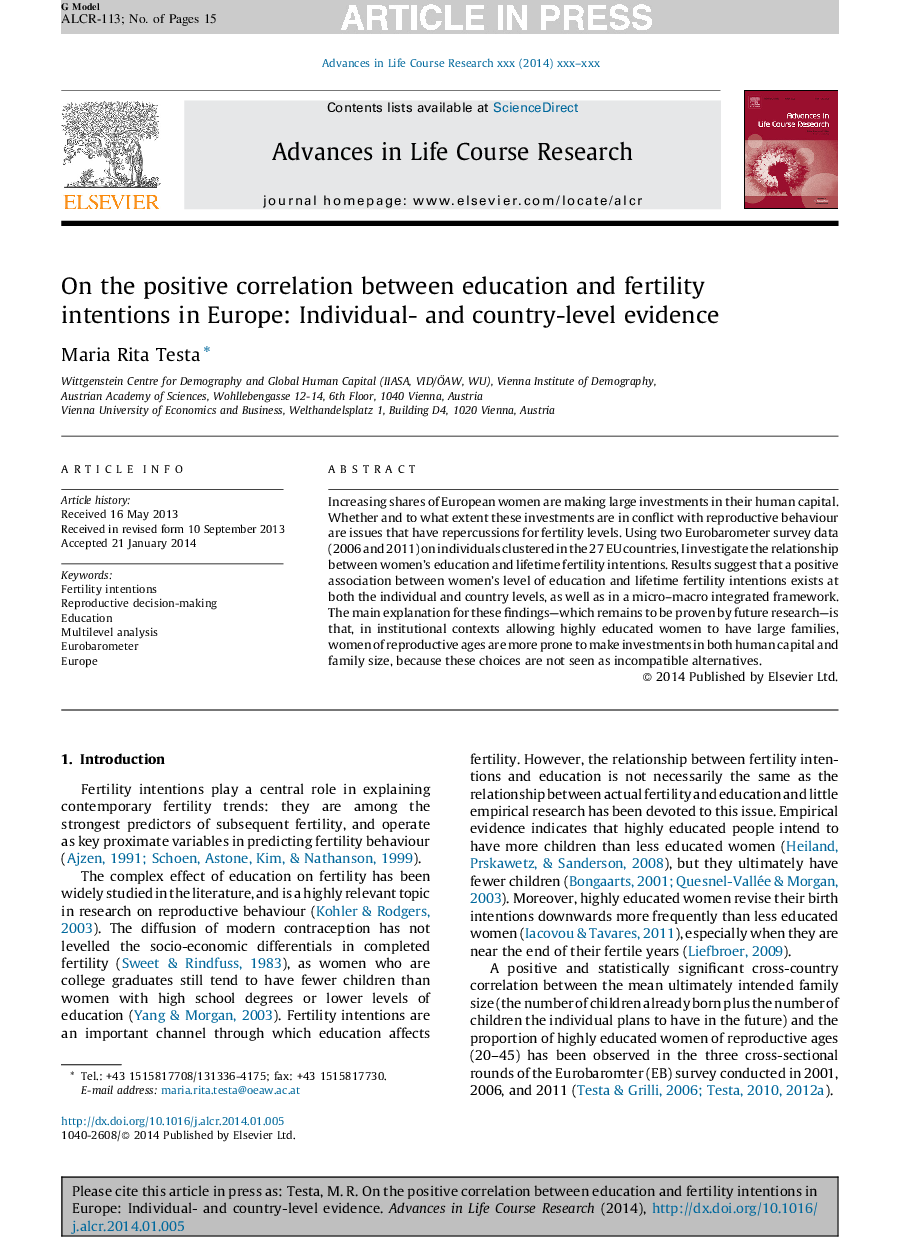| کد مقاله | کد نشریه | سال انتشار | مقاله انگلیسی | نسخه تمام متن |
|---|---|---|---|---|
| 6785036 | 534330 | 2014 | 15 صفحه PDF | دانلود رایگان |
عنوان انگلیسی مقاله ISI
On the positive correlation between education and fertility intentions in Europe: Individual- and country-level evidence
ترجمه فارسی عنوان
بر همبستگی مثبت بین اهداف آموزش و پرورش و باروری در اروپا: مدارک فردی و کشوری
دانلود مقاله + سفارش ترجمه
دانلود مقاله ISI انگلیسی
رایگان برای ایرانیان
کلمات کلیدی
ترجمه چکیده
افزایش مشارکت زنان اروپایی سرمایه گذاری های بزرگی در سرمایه انسانی آنها است. این که آیا این سرمایه گذاری ها در معرض رفتارهای باروری هستند یا خیر، مسائل مربوط به سطوح باروری هستند. با استفاده از دو داده ی بررسی یوروباربرت (2006 و 2011) در مورد افرادی که در 27 کشور عضو اتحادیه اروپا قرار دارند، رابطه ی بین آموزش زنان و نیت های باروری در زندگی را مورد بررسی قرار می دهم. نتایج نشان می دهد که یک رابطه مثبت بین سطح تحصیلات زنان و نگرش های باروری در طول زندگی در سطح فردی و کشور و همچنین در یک چارچوب یکپارچه در سطح کلان وجود دارد. توضیح اصلی این یافته ها که هنوز با تحقیقات آتی ثابت شده است این است که در زمینه های نهادی که زنان بسیار تحصیلکرده را قادر به داشتن خانواده های بزرگ می کند، زنان سنین باروری بیشتر مستعد ابتلا به سرمایه گذاری در سرمایه انسانی و خانواده هستند؛ زیرا این انتخاب ها جایگزین ناسازگار نیستند.
موضوعات مرتبط
مهندسی و علوم پایه
ریاضیات
آمار و احتمال
چکیده انگلیسی
Increasing shares of European women are making large investments in their human capital. Whether and to what extent these investments are in conflict with reproductive behaviour are issues that have repercussions for fertility levels. Using two Eurobarometer survey data (2006 and 2011) on individuals clustered in the 27 EU countries, I investigate the relationship between women's education and lifetime fertility intentions. Results suggest that a positive association between women's level of education and lifetime fertility intentions exists at both the individual and country levels, as well as in a micro-macro integrated framework. The main explanation for these findings-which remains to be proven by future research-is that, in institutional contexts allowing highly educated women to have large families, women of reproductive ages are more prone to make investments in both human capital and family size, because these choices are not seen as incompatible alternatives.
ناشر
Database: Elsevier - ScienceDirect (ساینس دایرکت)
Journal: Advances in Life Course Research - Volume 21, September 2014, Pages 28-42
Journal: Advances in Life Course Research - Volume 21, September 2014, Pages 28-42
نویسندگان
Maria Rita Testa,
